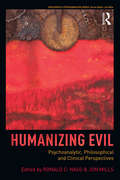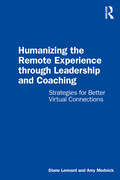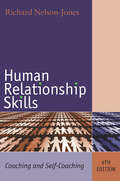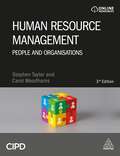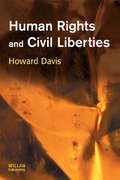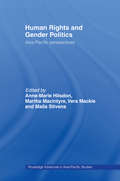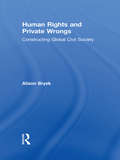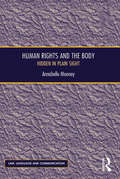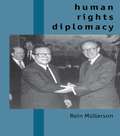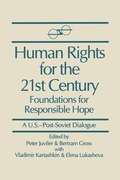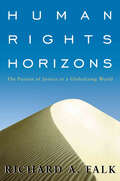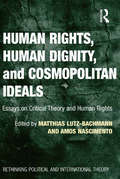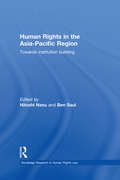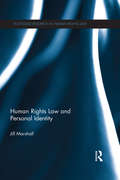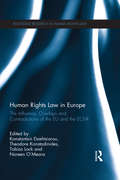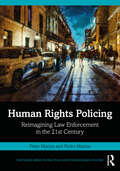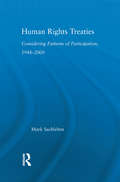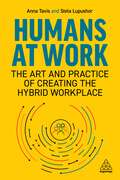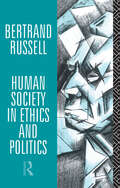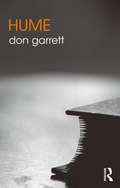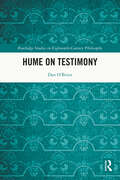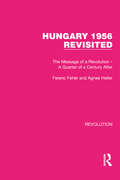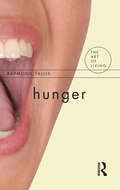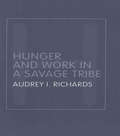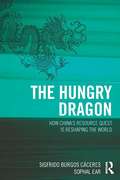Special Collections
Benetech’s Global Certified Accessible Titles
Description: Benetech’s GCA program is the first independent third-party EPUB certification to verify ebook accessibility. By creating content that is born accessible, publishers can meet the needs of all readers. Learn more: https://bornaccessible.benetech.org/
- Table View
- List View
Humanizing Evil
by Jon Mills and Ronald C NasoPsychoanalysis has traditionally had difficulty in accounting for the existence of evil. Freud saw it as a direct expression of unconscious forces, whereas more recent theorists have examined the links between early traumatic experiences and later ‘evil’ behaviour. Humanizing Evil: Psychoanalytic, Philosophical and Clinical Perspectives explores the controversies surrounding definitions of evil, and examines its various forms, from the destructive forces contained within the normal mind to the most horrific expressions observed in contemporary life. Ronald Naso and Jon Mills bring together an international group of experts to explore how more subtle factors can play a part, such as conformity pressures, or the morally destabilizing effects of anonymity, and show how analysts can understand and work with such factors in clinical practice. Each chapter is unified by the view that evil is intrinsically linked to human freedom, regardless of the gap experienced by perpetrators between their intentions and consequences. While some forms of evil follow seamlessly from psychopathology, others call this relationship into question. Rape, murder, serial killing, and psychopathy show very clear links to psychopathology and character whereas the horrors of war, religious fundamentalism, and political extremism resist such reductionism. Humanizing Evil is unique in the diversity of perspectives it brings to bear on the problem of evil. It will be essential reading for psychoanalysts, psychotherapists, philosophers, and Jungians. Because it is an integrative depth-psychological effort, it will interest general readers as well as scholars from a variety of disciplines including the humanities, philosophy, religion, mental health, criminal justice, political science, sociology, and interdisciplinary studies. Ronald Naso, Ph.D., ABPP is psychoanalyst and clinical psychologist in independent practice in Stamford, CT. The author of numerous papers on psychoanalytic topics, he is an associate editor of Contemporary Psychoanalytic Studies, and contributing editor of Division/Review and Journal of Psychology and Clinical Psychiatry. His book, Hypocrisy Unmasked: Dissociation, Shame, and the Ethics of Inauthenticity, was published by Aronson in 2010. Jon Mills, Psy.D., Ph.D., ABPP is a philosopher, psychoanalyst, and clinical psychologist. He is Professor of Psychology & Psychoanalysis at Adler Graduate Professional School, Toronto. A 2006, 2011, and 2013 Gradiva Award winner, he is Editor of two book series in psychoanalysis, on the Editorial Board for Psychoanalytic Psychology, and is the author and/or editor of thirteen books including his most recent works, Underworlds: Philosophies of the Unconscious from Psychoanalysis to Metaphysics, and Conundrums: A Critique of Contemporary Psychoanalysis, which won the Goethe Award for best book in 2013.
Humanizing the Remote Experience through Leadership and Coaching
by Diane Lennard and Amy MednickThis book responds to the growing need for understanding how we can foster wellness, raise engagement, and strengthen connections in professional contexts as human interactions become increasingly remote. Through research and case studies, the authors outline a paradox: the digital technology we use to connect with others can leave us feeling less connected. To understand what is missing from remote interactions, the authors examine the use of space, sensory cues, group dynamics, and challenges people encounter when the innate need for human connection is unmet. They provide practical advice to improve remote experiences, including ways to manage stress, avoid cognitive overload, and prevent burnout. Ultimately, the book highlights what is possible when we focus not only on the quantity and efficiency of our interactions, but also on the quality and depth of our human connections. The contemporary relevance of this topic makes the book essential for leaders, coaches, consultants, and other professionals working remotely, as well as students and interested individuals seeking to improve their personal and professional remote experiences.
Human Relationship Skills
by Richard Nelson-JonesHuman Relationship Skills: Coaching and Self-Coaching presents a practical 'how to' guide to relationship skills, showing how readers can improve and, where necessary, repair relationships. This thoroughly revised and updated fourth edition reflects the increased interest in coaching, showing how it can be applied to everyday life. In this essential book, Richard Nelson-Jones takes a cognitive-behavioural approach to coaching people in relationship skills. These skills are viewed as sequences of choices that people can make well or poorly; covering a range of skill areas the book assists readers to make affirming rather than destructive choices in their relationships. It begins by addressing the questions of "what are relationship skills?" and "what are coaching skills?", and follows with a series of chapters which thoroughly detail and illuminate various relationship skills including: - listening and showing understanding - managing shyness - intimacy and companionship - assertiveness and managing anger - managing relationship problems and ending relationships The book concludes with a chapter on how users can maintain and improve their skills by coaching themselves. Accessibly written and using activities, the book will be appropriate for those involved in 'life coaching' as well as general counselling and therapy. It will be essential reading for lecturers, coaches and trainers as well as students and anyone who wishes to improve their relationship skills.
Human Resource Management
by Stephen Taylor and Carol WoodhamsHuman Resource Management: People and Organisations provides thorough coverage of key HR topics and their context to enable students to excel in their academic studies and begin a successful career as a people professional. Now fully updated for a third edition, Human Resource Management: People and Organisations covers everything from essential UK employment law and managing the employment relationship through to resourcing and workforce planning, employee engagement and reward management. There is also expert discussion on organisation design and development as well as advice on how to improve organisational performance. This edition now includes brand new chapters on people management in an international context, wellbeing at work and equity, diversity and inclusion This book is fully supported by a range of pedagogical features including learning outcomes to summarise the content that will be covered in each chapter and track progress, reflective activities to consolidate learning and further reading suggestions to aid wider engagement with areas of particular interest. Case studies throughout also help students understand how the theory applies in practice. It is ideal reading for anyone studying the CIPD Associate Diploma in People Management as well as those in the early stages of their career in HR.. Online resources include PowerPoint slides, a lecturer guide and annotated web links.
Human Rights and Civil Liberties
by Howard DavisThis book provides a wide-ranging and accessible textbook covering the main areas of civil liberties and human rights law as it applies to England and Wales, meeting the requirements of undergraduate law syllabuses. The book sets out not only the legal rules, common law and statutes which relate to the field of civil liberties and human rights, but also the arguments and debates which have surrounded the development of an increasingly controversial area of the law, looking at the background principles underlying it, the coherence and consistency of the rules one to another and the social and political consequences of their application in practice. Particular attention is paid to the impact of developments in Europe, and especially to the Human Rights Act 1998 which has had an especial impact on the freedom to participate in determining public goals and the ability to preserve an area of personal autonomy. The book also addresses the nature and impact of the major statutory reforms in areas such as surveillance, protection of personal data and freedom of information, and devotes as well a chapter to the increasingly prominent issue of 'terrorism' and how the government and the law should respond.
Human Rights and Gender Politics
by Vera Mackie and Martha Macintyre and Anne-Marie Hilsdon and Maila StivensFirst Published in 2004. Routledge is an imprint of Taylor & Francis, an informa company.
Human Rights and Private Wrongs
by Alison BryskHuman Rights and Private Wrongs breaks new ground by considering a series of fascinating issues that are normally ignored by human rights specialists because they are too "private" to consider as policy issues: children's labor migration; refugee policy towards unaccompanied minors; financial matters of investor and business responsibility; and complex questions involving access to the benefits of pharmaceutical research, transnational organ trafficking, and the control over genetic research.
Human Rights and the Body
by Annabelle MooneyHuman Rights and the Body is a response to the crisis in human rights, to the very real concern that without a secure foundation for the concept of human rights, their very existence is threatened. While there has been consideration of the discourses of human rights and the way in which the body is written upon, research in linguistics has not yet been fully brought to bear on either human rights or the body. Drawing on legal concepts and aspects of the law of human rights, Mooney aims to provide a universally defensible set of human rights and a foundation, or rather a frame, for them. She argues that the proper frames for human rights are firstly the human body, seen as an index reliant on the natural world, secondly the globe and finally, language. These three frames generate rights to food, water, sleep and shelter, environmental protection and a right against dehumanization. This book is essential reading for researchers and graduate students in the fields of human rights and semiotics of law.
Human Rights Diplomacy
by Rein MullersonIn this insightful analysis of human rights diplomacy Rein Mullerson examines the way foreign policy instruments are used to promote human rights abroad as well as how human rights issues are used for the sake of other foreign policy aims.The book explores the relationship between human rights and international stability, the role of non-governmental organisations, the business community and mass media in formulating human rights agendas for governments and inter-governmental organisations. Also addressed are issues such as the universality of human rights in a multi-cultural world and the impact of religious and nationalistic extremism. Rein Mullerson concludes by looking at the role of the UN and other international bodies engaged in the promotion of human rights and how military force can be an option in settling violationsThe author argues that it tends to be regimes that are hostile to human rights which in turn cause instability in the international community. Throughout the work it is demonstrated that a concern for human rights is legitimate because of the impact they have on international relations and because of the common bonds that link all people.
Human Rights for the 21st Century
by Bertram Gross and Peter Juviler and Vladimir Kartashkin and Elena Lukasheva and Stanley KatzLeading specialists and activists from Russia and the USA join, in this volume, to offer a searching assessment of human rights in their own countries and in the world at large. They reflect on past history, present problems associated with system breakdown and decline, and the obstacles and opportunities on the way to the realisation of human rights in this uncertain post-Cold War era and the millennium that is now dawning. The participants in the discussions detailed here include Yelena Bonner, Viktor Chkhikvadze, Norman Dorsen, Riane Eisler, David Forsythe, Paula Garb, Charles Henry, Susan Heuman, Irina Lediakh, Vladimir Kudriavtsev, Pavel Litvinov, Richard Schifter, Henry Shue, Evgenii Skripilev, Vladimir Vlashihin, Oleg Vorobiev and the editors.
Human Rights Horizons
by Richard A. FalkIn Human Rights Horizons, one of the world's foremost authorities on human rights and international relations maps out the way to a more just and human global society. Borders are being erased; democracy and capitalism are spreading. The world is rapidly changing, and these changes are opening the door for the promotion of human rights to become and integral part of worldwide politics and law.In his provocative new book, Falk discusses the borderline between the promotion of human rights and the promotion of interventionist and coercive diplomacy. Can the US and the UN find an acceptable balance between unnecessary, protracted violence (Somalia) and simply letting genocide spread (Rwanda)? While looking at specific cases, Falk also sheds important new light on non-Western attitudes toward human rights, the challenge of genocidal politics, the intersection of morality and global security, and the pursuit of international justice. Thoughtful and very accessibly written, Human Rights Horizons clearly presents a path to an original new humanitarian policy for the 21st century.
Human Rights, Human Dignity, and Cosmopolitan Ideals
by Amos Nascimento and Matthias Lutz-BachmannThis book makes a significant contribution to the on-going international dialogue on the meaning of concepts such as human rights, humanity, and cosmopolitanism. The authors propose a new agenda for research into a Critical Theory of Human Rights. Each chapter pursues three goals: to reconstruct modern philosophical theories that have contributed to our views on human rights; to highlight the importance of humanity and human dignity as a complementary dimension to liberal rights; and, finally, to integrate these issues more directly in contemporary discussions about cosmopolitanism. The authors not only present multicultural perspectives on how to rethink political and international theory in terms of the normativity of human rights, but also promote an international dialogue on the prospects for a critical theory of human rights discourses in the 21st century.
Human Rights in the Asia-Pacific Region
by Hitoshi Nasu and Ben SaulThe Asia-Pacific is known for having the least developed regional mechanisms for protecting human rights. This edited collection makes a timely and distinctive contribution to contemporary debates about building institutions for human rights protection in the Asia-Pacific region, in the wake of ASEAN’s establishment in 2009 of a sub-regional human rights commission. Drawing together leading scholarly voices, the book focuses on the systemic issue of institutionalising human rights protection in the Asia-Pacific. It critically examines the prospects for deepening and widening human rights institutions in the region, challenging the orthodox scepticism about whether the Asia-Pacific is "ready" for stronger human rights institutions and exploring the variety of possible forms that regional and sub-regional institutions might take. The volume also analyses the impediments to new institutions, whilst questioning the justifications for them. The collection provides a range of perspectives on the issues and many of the chapters bring interdisciplinary insights to bear. As such, the collection will be of interest to scholarly, practitioner, and student audiences in law, as well as to readers in international relations, political science, Asian studies, and human rights.
Human Rights Law and Personal Identity
by Jill MarshallThis book explores the role human rights law plays in the formation, and protection, of our personal identities. Drawing from a range of disciplines, Jill Marshall examines how human rights law includes and excludes specific types of identity, which feed into moral norms of human freedom and human dignity and their translation into legal rights. The book takes on a three part structure. Part I traces the definition of identity, and follows the evolution of, and protects, a right to personal identity and personality within human rights law. It specifically examines the development of a right to personal identity as property, the inter-subjective nature of identity, and the intercession of power and inequality. Part II evaluates past and contemporary attempts to describe the core of personal identity, including theories concerning the soul, the rational mind, and the growing influence of neuroscience and genetics in explaining what it means to be human. It also explores the inter-relation and conflict between universal principles and culturally specific rights. Part III focuses on issues and case law that can be interpreted as allowing self-determination. Marshall argues that while in an age of individual identity, people are increasingly obliged to live in conformed ways, pushing out identities that do not fit with what is acceptable. Drawing on feminist theory, the book concludes by arguing how human rights law would be better interpreted as a force to enable respect for human dignity and freedom, interpreted as empowerment and self-determination whilst acknowledging our inter-subjective identities. In drawing on socio-legal, philosophical, biological and feminist outlooks, this book is truly interdisciplinary, and will be of great interest and use to scholars and students of human rights law, legal and social theory, gender and cultural studies.
Human Rights Law in Europe
by Kanstantsin Dzehtsiarou and Theodore Konstadinides and Tobias Lock and Noreen O’MearaThis book provides analysis and critique of the dual protection of human rights in Europe by assessing the developing legal relationship between the Court of Justice of the European Union (CJEU) and the European Court of Human Rights (ECtHR). The book offers a comprehensive consideration of the institutional framework, adjudicatory approaches, and the protection of material rights within the law of the European Union and the European Convention on Human Rights (ECHR). It particularly explores the involvement and participation of stakeholders in the functioning of the EU and the ECtHR, and asks how well the new legal model of ‘the EU under the ECtHR’ compares to current EU law, the ECHR and general international law. Including contributions from leading scholars in the field, each chapter sets out specific case-studies that illustrate the tensions and synergies emergent from the EU-ECHR relationship. In so doing, the book highlights the overlap and dialectic between Europe’s two primary international courts. The book will be of great interest to students and researchers of European Law and Human Rights.
Human Rights Policing
by Peter Marina and Pedro MarinaRelying on intense ethnographic research and extensive experiences teaching human rights policing to police officers, this book teaches law enforcement professionals how to apply human rights to their everyday interactions with community members. The data collected throughout this research process offers the reader first-hand accounts of police officers addressing the most important human rights as they relate to policing, telling stories of using their human agency while on the job, and providing insights into their discussions with community members on human rights, among other important topics. Human rights remain a relatively new concept in human civilization, but one largely unrealized at this point in history. Can police officers serve as the harbingers of human rights in a world that desperately needs it? We say yes. It starts with applying human rights to police work. But this book does more than teach police officers how to apply human rights to their careers. It reimagines the institution of law enforcement as we push toward the later stages of modernity. Refusing to tell readers what to think, this book provides the intellectual tools on how to think about policing in new and creative ways. It seeks to bring out the readers’ full creative potential as law enforcement agents, police officers, and criminal justice professionals and activists. This book advances new ideas throughout each chapter on how to make human rights policing a reality. The ideas in each chapter build on each other, offering a small piece of the puzzle and all the steps necessary to advance the goals of human rights policing. The book (1) analyzes the United Nations Declaration of Human Rights and how it applies to policing, (2) develops a three-fold typology called “Human Rights Policing Social Interactions,” (3) discusses the relationship between the use of power and human rights, (4) explains the power of human agency to transcend the ordinary, (5) uncovers the creation of folk devils that threaten human rights, (6) describes how to use the sociological imagination to understand community members, (7) reveals the importance of storytelling to see the world from the actor’s point of view, (8) discusses the double consciousness and the creation of the “other,” (9) describes what we call “soulful policing” and engaging with the community— Chicago style, and (10) provides social policy suggestions at both the national level and local policing level. This book will challenge the reader in fascinating and highly surprising ways to think about, and, further, to reimagine policing as we push toward the future. It will appeal to professionals at all levels of law enforcement, and will be useful in programs offering degrees and/or certificates to students of criminal justice.
Human Rights Treaties
by Mark SachlebenThe book examines patterns of participation in human rights treaties. International relations theory is divided on what motivates states to participate in treaties, specifically human rights treaties. Instead of examining the specific motivations, this dissertation examines patterns of participation. In doing so, it attempts to match theoretical expectations of state behavior with participation. This book provides significant evidence that there are multiple motivations that lead states to participate in human rights treaties.
Humans at Work
by Anna Tavis and Stela LupushorIs your organization strategically prepared for the digital and distributed workplace?Technology, data analytics and artificial intelligence already impact how people work and engage with organizations. A dispersed workforce, greater transparency, social change, generational shift and value chain disruptions are driving new behaviors and expectations from the workplace. Together, these trends are shaping a new era of distributed and digitally enabled network of workers where the work comes to workers instead of the workers going to work. In Humans at Work, employee and workplace experience experts Anna Tavis and Stela Lupushor advocate for the adoption of human-centric practices as a critical and necessary part of adapting work and workplaces to the future of work. Outlining the four factors (digitization of work, distributed workplaces, organizational redesign and changing workforce) driving the dramatic changes in the workplace, each chapter provides examples of how innovative companies are building workplace infrastructure and reshaping norms, serving new markets and adopting new technologies. Filled with examples from both start-ups and established companies, Humans at Work is the workplace leader's guide to building a workplace that creates market value by making work more human.
Human Society in Ethics and Politics
by Bertrand RussellFirst published in 1992. Routledge is an imprint of Taylor & Francis, an informa company.
Hume
by Don GarrettBeginning with an overview of Hume's life and work, Don Garrett introduces in clear and accessible style the central aspects of Hume's thought. These include Hume's lifelong exploration of the human mind; his theories of inductive inference and causation; skepticism and personal identity; moral and political philosophy; aesthetics; and philosophy of religion. The final chapter considers the influence and legacy of Hume's thought today. Throughout, Garrett draws on and explains many of Hume's central works, including his Treatise of Human Nature, Enquiries Concerning Human Understanding, and Dialogues Concerning Natural Religion. Hume is essential reading not only for students of philosophy, but anyone in the humanities and social sciences and beyond seeking an introduction to Hume's thought.
Hume on Testimony
by Dan O'BrienThis book is the first devoted to Hume’s conception of testimony. Hume is usually taken to be a reductionist with respect to testimony, with trust in others dependent on the evidence possessed by individuals concerning the reliability of texts or speakers. This account is taken from Hume’s essay on miracles in An Enquiry concerning Human Understanding. O’Brien, though, looks wider than the miracles essay, turning to what Hume says about testimony in the Treatise, the moral Enquiry, the History of England and his Essays. There are social aspects of testimonial exchanges that cannot be explained purely in terms of the assessment of the reliability of testifiers. Hume’s conception of testimony is integrated with his account of how history informs our knowledge of human nature, the relation between sympathy and belief and between pride and the conception we have of our selves, the role played by social factors in the judgment of intellectual virtue, and the importance Hume places on epistemic responsibility and the moral and personal dimensions of testimonial trust. It is not possible to focus on testimony without allowing other aspects of our nature into the frame and therefore turning also to consider sympathy, wisdom, history, morality, virtue, aesthetic judgment, the self and character. O’Brien argues that Hume’s reliance on the social goes deep and that he should therefore be seen as an anti-reductionist with respect to testimony. Hume on Testimony will be of interest to researchers and advanced students working on Hume and on early modern and contemporary approaches to the epistemology of testimony.
Hungary 1956 Revisited
by Agnes Heller and Ferenc FehérThis book, first published in 1983, is a radical reinterpretation of the Hungarian revolution in the context of world politics and Eastern Europe as a whole. It examines the events and protagonists with a fresh eye, and relies on witnesses and participants for the rigorous documentary backing.
Hunger
by Raymond TallisUnderstanding hunger is the key to understanding ourselves. While they seem the most obvious things about us, our hungers are also deeply mysterious, arising out of, and casting light on, the unique character of human consciousness. In humans, physiological need is transformed into a multitude of needs that are remote from organic necessity. Even first-level biological hunger is experienced differently in humans; and little in human feeding behaviour has any parallel in the animal kingdom.In this book, Ray Tallis takes us through the different levels of our hunger. Out of our primary appetites arise a myriad of pleasures and tastes that are elaborated in second-level hedonistic hungers creating new values. The evolution of appetite into desire opens the way to social hungers such as the hunger for acknowledgement. Awareness of death awakens a further level of hunger for something that lies beyond the pell-mell of successive experiences leading towards extinction. The art of living is the art of managing our hungers.
Hunger and Work in a Savage Tribe
by Audrey RichardsHunger and Work in a Savage Tribe examines the cultural aspects of food and eating among the Southern Bantu, taking as its starting point the bold statement 'nutrition as a biological process is more fundamental than sex'. When it was first published in 1932, with a preface by Malinowski, it laid the groundwork for sociological theory of nutrition. Richards was also among the first anthropologists to establish women's lives and the social sphere as legitimate subjects for anthropological study.
The Hungry Dragon
by Sophal Ear and Sigfrido Burgos CáceresThis volume provides an up to date and accessible examination of China's global search for resources, focusing primarily on oil. This focus provides a powerful rationale to explain China's actions overseas, as it impacts on economic, energy and foreign policies. A strong feature of the book is a comprehensive examination of geopolitical issues. Three country case studies (Angola, Brazil and Cambodia) are complemented by two chapters on opportunities and risks to China, and an examination as to how strategies are developed into tangible actions. This book also examines a number of overlapping debates regarding the varieties of capitalisms (autocratic vs. democratic), the urgent need for rebalancing as the world undergoes global crises, and the issues surrounding natural resources in the context of governance, liberal-oriented notions and poverty traps. The book is aimed at general as well as specialized readers and examines the subject in relation to international affairs, especially how the geopolitics of scarcity is driving states to be tenser, more observant of each other, and more acute to foreign initiatives.
